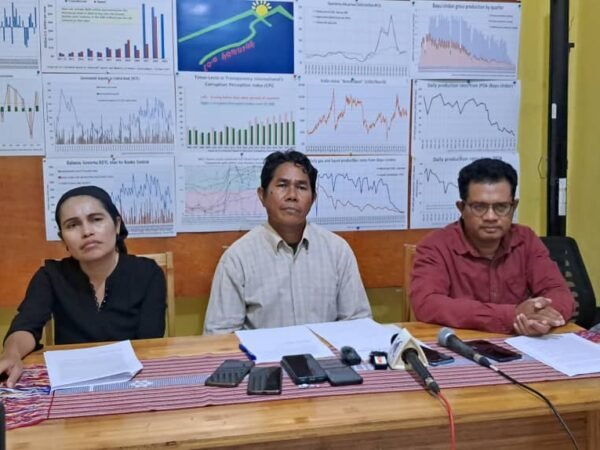Dili, October 16, 2024 (Média Democracia) – In commemoration of World Food Day, LH (La’o Hamutuk) called on the government to invest in sustainable agriculture to ensure the human right to food, the theme of the 2024 World Food Day celebration is, “The right to food to improve life and future”. This theme reminds countries that access to food is everyone’s right, therefore all countries must strive to invest and prioritize food production activities to be more resilient. The press conference was held at the LH hall, Bebora, Dili, on Tuesday.
In the press conference delivered by MC, Mariano Ferreira, he first congratulated the farmers in Timor-Leste and also around the world. Although, you (farmers) always face some challenges, but continue to engage in food production activities by offering food for the lives of many people. World Food Day reminds that the people of Timor-Leste still face problems in accessing sufficient and nutritious food, which still has an impact on their lives today and in the future. A major factor causing the problem of food shortages and malnutrition in this country is that production in our country is not optimal and still relies on imports from abroad that do not have much good nutrition. For more than 22 years, the government of Timor-Leste and development partners have wasted a lot of money on the agriculture, fisheries, livestock and plantation sectors but still have not guaranteed the right of all residents to food.
“We recognize that the government and development partners have implemented many programs to develop the agricultural sector such as establishing irrigation, distributing tractors, sharing seeds and placing extension workers in rural areas, but most of these programs are aimed at increasing rice and corn production and have not paid attention to other local products. As a result, now Timor-Leste is not only importing rice but also other local products that were previously produced by our farmers such as potatoes, garlic, shallots and tomatoes which we now receive in tons from Indonesia.” He said.
He continued, this situation is a major concern for all parties because at the same time the agricultural sector continues to experience shortages due to limitations in the development of physical infrastructure such as roads, offices, and housing. The large number of elderly people who continue to age and have an impact on their productivity, this has a major impact on climate change in the agricultural sector which will continue.
“In commemoration of World Food Day 2024, we would like to convey ideas and recommendations to the government on how to strengthen the agricultural sector to ensure people’s right to sufficient and nutritious food in a sustainable manner. In the context of discussing the proposed 2025 State General Fund, we hope that these recommendations can help the government and parliament to discuss and approve funds that are sensitive to the problems faced by the agricultural sector.” He added.
Here are some specific recommendations that the government needs to pay attention to regarding farmers in order to increase production in our country, such as the following:
- Prioritize capacity building and training for farmers, fishermen, and livestock breeders in order to increase production and sustainable management. Also increase the capacity of farmer and fisher families in order to improve their standard of living through various economic diversifications or sources of income.
- Overcoming the problem of water shortages for agriculture, especially in the summer which affects farmers. This can be done through the construction of small-scale irrigation systems or water reservoirs in the mountains to revive springs that always dry up in the summer.
- Support groups and small businesses that process agricultural products to have access to modern equipment so that they can produce competitive products and import products. This equipment includes packaging equipment and equipment for testing nutritional contexts.
- Creating an environment that allows farmers to better access markets by improving rural roads to facilitate the movement of people and their agricultural products to the market. At the same time, limiting the import of agricultural products that can be produced in our country.
- Continue to provide support to fishermen with adequate fishing facilities and infrastructure and better market access, as well as include fish catches in school snack programs and provision for the public institutions.
- Identify and supervise agricultural products other than rice that are still being imported even though we have domestic production potential, such as potatoes, fresh and dried fish, shallots and tomatoes that are continuously imported from Belu NTT because it can kill domestic production. Provide support to farmers to produce these products.
- Provide funding priority for the development of agriculture, animal and fish farming at the household level in order to produce healthy and nutritious products for families.
- Promote food diversification and awareness to change food culture as a way to reduce rice imports and promote other local foods that are more nutritious.
- Promote agroecology, the use of local resources to increase production in a way that does not damage the environment and contributes to climate improvement.
Journalist : Domingas da Silva
Photo : Nelfiano

